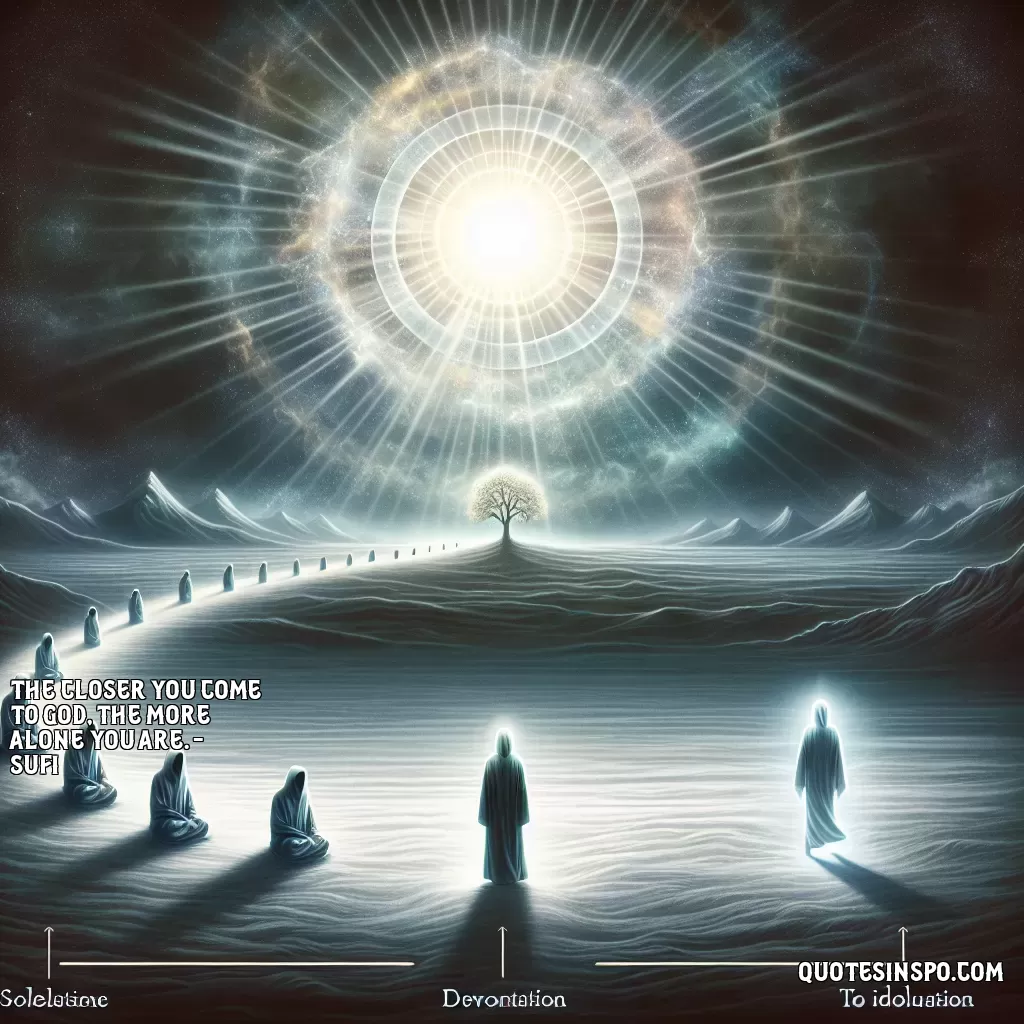
The closer you come to God, the more alone you are. - Sufi
The quote "The closer you come to God, the more alone you are," attributed to Sufi thought, encapsulates a profound spiritual paradox. At its core, this statement suggests that as individuals embark on the spiritual journey and pursue a deeper relationship with the divine or God, they may experience increased solitude. This solitude is not necessarily a physical isolation, but rather an existential and introspective one. In the journey towards spiritual enlightenment or closeness to God, a person often moves away from worldly attachments and superficial distractions. This path may require a withdrawal from societal norms, material desires, and even the expectations of those around them. As one seeks spiritual purity and inner truth, they enter a realm where few others tread, leading to a sense of being alone on a unique path. This solitude is a result of focusing on the internal rather than the external, fostering a deep inner dialogue with oneself and the divine. Moreover, this feeling of being alone can stem from a realization that the divine experience is personal and subjective, often difficult to articulate or share with others who might not have had similar experiences. In essence, as one draws nearer to God, the path becomes increasingly individualized, marked by personal struggles, revelations, and transformations that can only be understood by the individual experiencing them. Such solitude, however, is not inherently negative. It offers an opportunity for profound self-discovery, peace, and a deeper understanding of one's place in the universe. The solitary nature of this spiritual quest can lead to profound moments of clarity, enlightenment, and connection with the divine, which might not be possible amidst the noise of the world. In summary, the quote underscores the idea that true spiritual growth and closeness to God often involves embracing solitude as a necessary component of the journey.
Quote By: Sufi
**The Life and Legacy of Sufi: A Journey Through Spirituality**
Sufi, a term often used to describe practitioners of Sufism, is deeply embedded in the mystic traditions of Islam. The origins of Sufism date back to the early centuries of Islam, with its foundation laid around the 8th century. The term "Sufi" is believed to be derived from the Arabic word "suf," which means wool, referencing the simple woolen garments worn by early practitioners who sought to live a life of spiritual purity and detachment from worldly pleasures.
One of the pivotal figures in the history of Sufism is Jalal ad-Din Muhammad Rumi, a 13th-century Persian poet, Islamic scholar, and Sufi mystic. Rumi is renowned for his profound poetry that encapsulates the essence of Sufi teachings. His work emphasizes love, unity, and the importance of connecting with the divine. Rumi’s relationship with his mentor, Shams of Tabriz, had a significant impact on his spiritual journey, leading him to express the depths of divine love and the search for truth through poetic form.
Sufi practices often include meditation, chanting (dhikr), and dances (such as the whirling dervishes), which serve as tools to foster a deeper connection with God. The Sufi way is one that emphasizes personal experience and the inner dimensions of faith over rigid dogma. Authors like Rumi have articulated the idea that love is the pathway to divine truth, making Sufi expressions deeply relatable across cultures and eras.
Throughout history, Sufism has faced both support and criticism within the broader Islamic community. Despite this, its teachings have persisted, influencing art, music, and literature worldwide. Sufi orders, known as tariqas, have proliferated, promoting spiritual brotherhoods and practices that continue to thrive today.
In summary, Sufi represents a rich tradition that offers insights into the nature of love, unity, and the pursuit of a personal relationship with the divine. Through the works of notable authors like Rumi, the beauty and wisdom of Sufism continue to inspire and touch the lives of countless individuals around the globe.